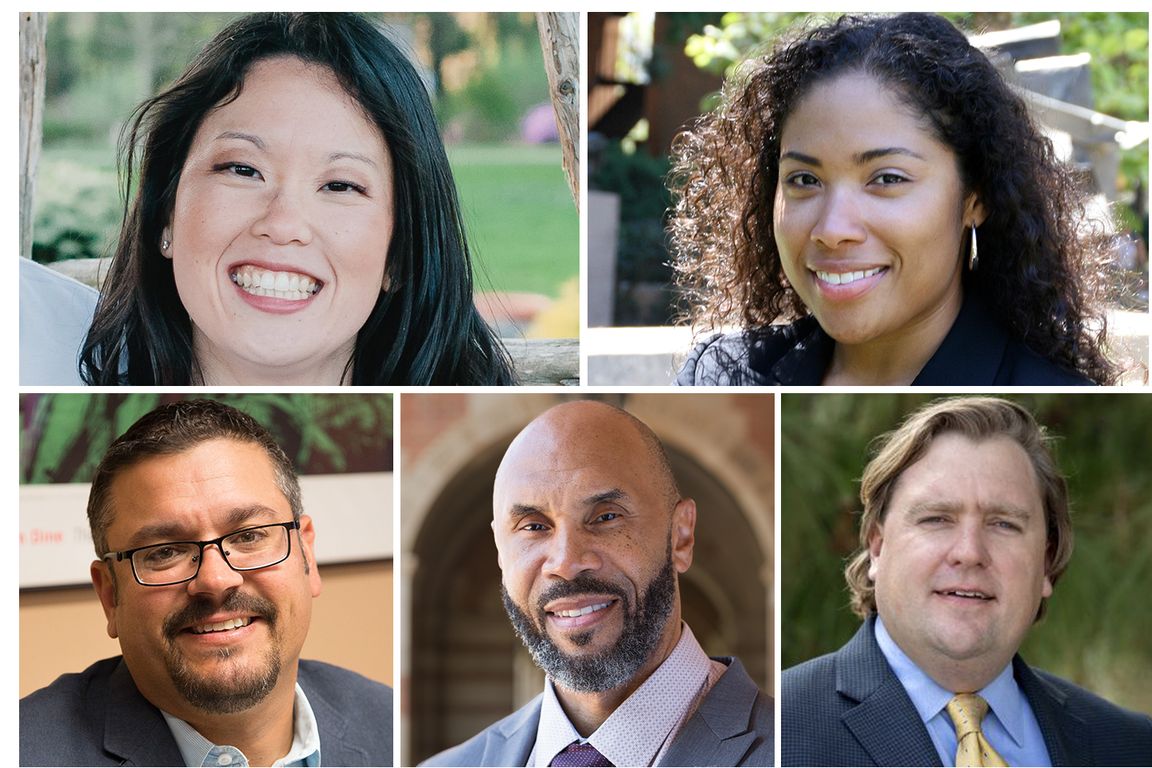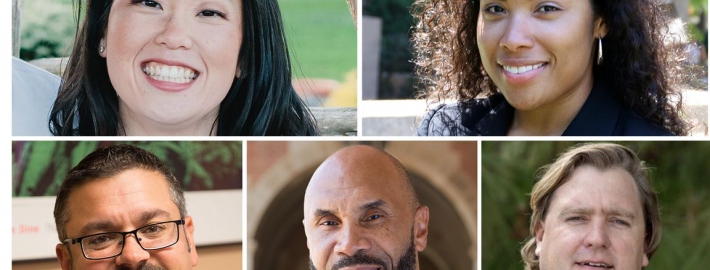In election salon, UCLA faculty discuss how to protect the right to vote

Clockwise from top left: Natalie Masuoka, Lorrie Frasure, Chad Dunn, Darnell Hunt and Matt Barreto.(Photo Credit: UCLA)
With less than two weeks until the election day, early voter turnout numbers continue to shatter records across the United States. But that doesn’t mean that Republicans or Democrats are ahead or that voters have easy decisions or safe options when it comes to casting their ballots, and that’s particularly true for people of color, according to a panel of UCLA voting rights experts who spoke Oct. 19.
“Right now, the right to vote is under attack,” Matt Barreto, professor of political science and the co-founder of the research and polling firm Latino Decisions, told the audience attending the webinar, “Protecting the Right to Vote in the 2020 Presidential Election.”
Barreto was one of four panelists discussing the right to vote that also included Lorrie Frasure, associate professor of political science and acting director of the Ralph J. Bunche Center for African American Studies, Natalie Masuoka, chair of the Asian American studies department, and Chad Dunn, co-founder of the UCLA Voting Rights Project. The panel was moderated by Darnell Hunt, dean of UCLA College’s Division of Social Sciences.
“There is a lot of nervousness about the effort to suppress votes,” said Barreto, who is also a professor of Chicana and Chicano and Latin American Studies and is working for the Joe Biden-Kamala Harris campaign. “The response we are seeing to that suppression is that over 27 million people have already voted. The fact that we are seeing such historic records during a pandemic is telling.”
But historic voter turnout doesn’t tell the whole story. This year marks the 55th anniversary of the landmark 1965 Voting Rights Act, which prohibits discriminatory voting practices, but recent court rulings have severely weakened the act. The fundamental right to vote is not a federal law, and in the current political landscape, studies led by Barreto and Dunn note that suppression tactics are on the rise, effectively discouraging people of color to vote.
Frasure noted that Black voters, typically highly engaged in the political process, are more likely to feel their vote will be suppressed, particularly when it comes to mail-in ballots. They also are more likely to believe there will be trouble at the polls.
“In many states, Blacks know their ballot is more likely to be rejected if they mail it in, but there is a real fear about sickness in going out to the polls,” Frasure said. “This is heavy for voters. They are thinking: Am I six feet apart? Is my mask adjusted properly on my nose? They have all of these thoughts as they seek to be a part of the democratic process because they want to see change based on things they’ve seen in their own lives. It’s consequential.”
In terms of the Asian community, the experience may be different, but have no less of an impact.
“In many ways, for Asian Americans they have a different story. This community doesn’t have a longstanding history of seeing trustworthy and equity voting procedures,” said Masuoka, who pointed out that a higher percentage of Asians are immigrants than other minority groups and that more than 70% of whom are adults. “For many, this is their first election, and this is a problem example we’re setting for new voters about what it’s like to participate in American democracy. [Voter suppression tactics] are intimidating our new Americans and preventing them from casting ballots.”
Hunt and Dunn both noted that the notion we are in a post-racial period is not accurate. “We will never be in a place where we don’t need a law protecting the right to vote. Right now, we have more holes in the sail than we’ve ever had [in terms of protecting voting rights], but if we have enough of a wind, we can still be pushed forward. Vote denial only works in close elections. If we have enough people that vote early, we can turn this around.”
But just because early voter turnout is at an all-time high doesn’t mean either side is ahead, said panelists. Frasure pointed out that 90% of Blacks may lean Democratic, but that doesn’t mean they will turn out.
“Voters get complacent and say, ‘Look at the surge in early voting,’ and they decide to sit this one out,” Barreto said. “And none of us who believe in American democracy can afford to sit this one out. We are expecting a big number of votes, and while early numbers are encouraging, they are expected. No side is ahead right now. Don’t get complacent — push your community to get out and vote.”
On a final note, Dunn advocated for unity.
“Everybody’s vote counts,” he said. “The more we communicate that to our neighbors, the more that’s part of our public fabric, the better off we’ll all be as Americans.”
Voting tips:
-Cast your ballot early if you are going to vote by mail or if you plan to drop it off at an official ballot box. Track your ballot in California.
-If you are going vote in person, you will probably have to to stand in line. So wear a mask, bring food and a charged-up cell phone, and ask if friends or family can accompany you.
-Offer to help others fill out their ballot, particularly elderly or young people who have never voted before.
-You can serve a role in the political process: Talk to your neighbors, set up zoom meetings or join text-banking efforts.
This article, written by Melissa Abraham, originally appeared in the UCLA Newsroom.




